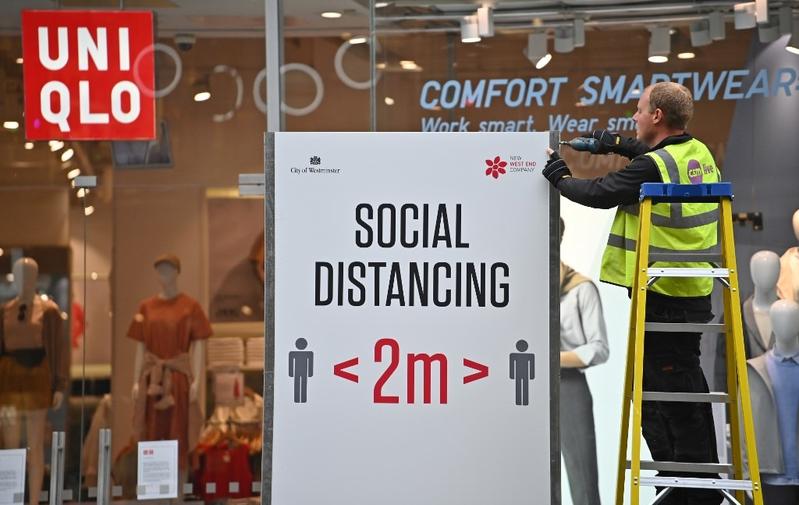 Workers install signs telling pedestrians and shoppers to adhere to the British government's current social distancing guidelines, and stay two meters apart, outside shops on Oxford Street in central London on June 11, 2020, as non-essential shops prepare to re-open on June 15. (JUSTIN TALLIS / AFP)
Workers install signs telling pedestrians and shoppers to adhere to the British government's current social distancing guidelines, and stay two meters apart, outside shops on Oxford Street in central London on June 11, 2020, as non-essential shops prepare to re-open on June 15. (JUSTIN TALLIS / AFP)
A "very small" number of COVID-19 cases have arrived in the United Kingdom from China since the beginning of the outbreak, according to a study of genetic and travel data.
Cases from Italy were particularly high in January and February, and by early March travelers from Spain and France provided the majority of new cases
More than 1,300 individual travelers brought the coronavirus into the UK up to late May, the data showed, with the majority of cases coming from elsewhere in Europe. The research dispels the largely media-driven narrative that a "patient zero" is to blame for the spread of the virus in the UK.
"The contribution of China and other Asian countries to the number of importations was very small," said the authors of the study, which was conducted by the COVID-19 Genomics UK Consortium, or COG-UK, and Oxford and Edinburgh universities.
The authors of the study estimate that 34 percent of detected UK transmission lineages arrived via inbound travel from Spain, 29 percent came from France, 14 percent came from Italy, and 23 percent originated from other countries.
Cases from Italy were particularly high in January and February, and by early March travelers from Spain and France provided the majority of new cases.
In all, the study detected 1,356 independent transmission lineages, based on analysis of genome and travel data up to May 22. The authors stated that the true figure is likely to be far higher, because virus genome sequences were generated for only a small fraction of UK infections.
The majority of these transmissions originated from European nations in March, according to the COG-UK, which is a consortium of National Health Services organizations, UK public health agencies, several academic institutions, and the Cambridgeshire-based genomics center the Wellcome Sanger Institute.
ALSO READ: UK urges Britons to participate in coronavirus tracing system
"The COG-UK consortium has now sequenced more than 24,000 genomes," said Sharon Peacock, director of the COG-UK. "This is providing the foundation for a better understanding of this outbreak."
Help for policymakers
Ewan Harrison, a fellow at the Wellcome Sanger Institute, said that large-scale data and genomic sequencing can help inform policymakers on appropriate measures to limit the flow of pathogens such as novel coronavirus.
"Due to our ability to track the genomes of the SARS-CoV-2 virus through the sequencing by the COG-UK consortium, we can now link that with other forms of data to truly understand how the pandemic moves through a country or region," Harrison said.
The study pours cold water on the theory that the UK outbreak of COVID-19 was started by one or a handful of individuals. At the beginning of the outbreak in the UK, the first people diagnosed with the virus were subject to huge amounts of media scrutiny.
The COG-UK study, which has not been peer-reviewed, now indicates that hundreds of separate introductions of the virus were responsible for its spread in Britain.


